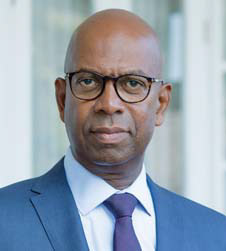MESSAGE FROM THE CEO
“As a business, we innovate to create sustainable, commercial business solutions, not philanthropic gestures.”
MIXED RESULTS ON OUR SDG INTEGRATION JOURNEY
In 2016 we began the process of integrating nine of the 17 Sustainable Development Goals (SDGs) into our business strategy. A year later, we have made considerable progress in aligning our business objectives to these goals, in line with our commitment to creating viable responses to the challenges faced by society. Some of the areas in which we have recorded progress include Good Health And Wellbeing (SDG 3), Quality Education (SDG 4), Decent Work And Economic Growth (SDG 8), and Industry, Infrastructure And Innovation (SDG 9). Additionally, we have introduced various initiatives in an effort to achieve SDG 12 (Responsible Consumption And Production), including the introduction of our internal ‘zero waste to landfill’ programme, which is already ensuring that 97 per cent of the waste generated within our administrative buildings in Nairobi is recycled or reused. This initiative is buoyed by the continued success of our e-waste programme, which has collected 855 tonnes of electronic waste since its inception in 2013, and complements the replacement of single use plastic bags at our retail shops with eco-friendly, reusable carry bags. This move alone is expected to replace up to 7 million plastic bags distributed per annum. While our performance in these areas is reason for celebration, it is unfortunate that these gains are somewhat overshadowed by the increase in our carbon footprint.
We are cognizant of the very real threats posed by climate change, and have committed to becoming a ‘net zero’ carbon-emitting company by the year 2050.
To get us there, we have reduced the number of sites running solely on diesel powered generators, and are exploring ways in which we can do more, including: compensating for our emissions through carbon offsets, embracing hybrid or renewable power solutions and introducing science-based carbon reduction targets.
GENDER, DIVERSITY AND INCLUSION
In the past year, we have refl ected deeply on what true diversity and inclusion mean to out business. While we are proud of our overall gender equality as a company, we cannot be content with the lack of equal gender representation in senior management and the executive leadership, which remain 68 and 75 percent male, respectively. So we have committed to matching the number of women to men in senior management by 2020. To do so, we have put in place a number of initiatives aimed at creating more growth opportunities for women at Safaricom, including our Women in Leadership and Women in Technology programmes. We are also making headway in relation to achieving SDG 10 (Reduced Inequalities), through our pledge to increase the number of staff with disabilities from the current 1.7 per cent to 5 per cent by 2020.
“We cannot succeed in isolation. We need a ‘coalition of the willing’ to address these challenges.”
To achieve this goal, we have provided various business units with specifi c hiring targets to open up more opportunities for qualifi ed Kenyans with disabilities over the next three years. We are also working with organisations such as the Kenya Union for the Blind and the Kenyan Paraplegic Organisation to form a network through which we can identify suitable candidates. By doing this, we hope that we can influence others in the public and private sectors to work towards the full inclusion of people with disabilities.
THE B TEAM – AFRICA
The private sector has a responsibility to drive conversations around sustainability, not only because we have a lot to gain from running sustainable businesses, but also because by doing so we can empower and uplift communities.
To achieve this, we need a ‘coalition of the willing’, and B Team – Africa is that very coalition. The B Team – Africa is an alliance of progressive business leaders who are dedicate to empowering Africans by creating more sustainable and just economies across the continent. The alliance was formally launched in March 2018, with the purpose of creating a network of people and resources who can catalyse the adoption of the SDGs, and create shared value.
CREATING SHARED VALUE
At Safaricom, we like to say that business of business is not just business any more. Over and above innovating and selling relevant products and services, our business exists to transform lives. That is our purpose, and that is what we believe will guide us as we seek to create shared value not just for our shareholders, but for stakeholders including the communities we operate in. This year’s theme, Shared Value, is therefore very fitting. Not only does it speak to our purpose, it brings to life our brand promise of Twaweza, which is that when we come together, great things happen. What we have been able to achieve since our inception in the year 2000 is testament to the power of coming together. It is that same spirit that informs our positive outlook for the coming years as we work towards creating shared value, in line with our believe that when we put purpose and people before profits, then the profits will naturally follow.


 Bob Collymore
Bob Collymore